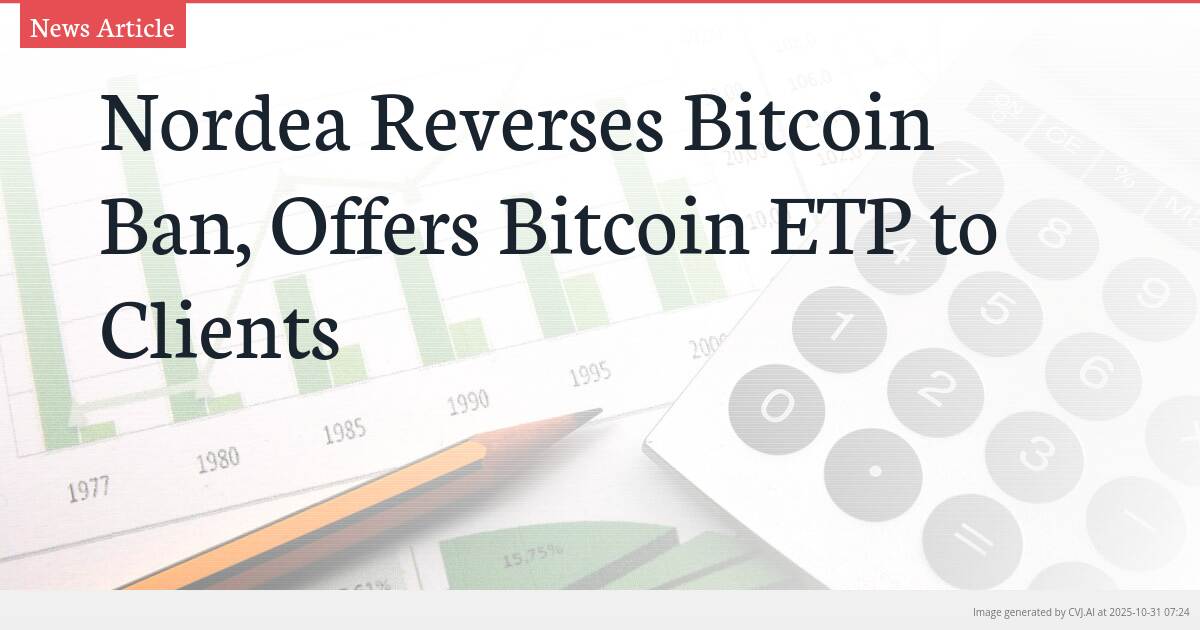This summary text is fully AI-generated and may therefore contain errors or be incomplete.
Introduction
Nordea Bank, Scandinavia’s largest financial institution, has dramatically reversed its 2018 prohibition on cryptocurrency exposure by announcing it will offer clients access to a Bitcoin-linked exchange-traded product (ETP) developed by CoinShares. The bank, which previously banned employees from buying Bitcoin due to regulatory concerns, now cites growing adoption and regulatory clarity as reasons for the policy shift. This move signals a notable evolution in traditional banking’s approach to cryptocurrency assets and reflects the increasing institutional acceptance of digital currencies within regulated frameworks.
Key Points
- Nordea reversed its 2018 employee Bitcoin ban, now offering Bitcoin ETP access to customers
- The Bitcoin ETP is developed by CoinShares and holds actual Bitcoin as its underlying asset
- The product is offered as execution-only, meaning Nordea provides no investment advice
From Ban to Adoption: Nordea's Crypto Evolution
Nordea’s journey with cryptocurrency represents a remarkable transformation in institutional thinking. In 2018, the Scandinavian banking giant took a hardline stance against digital assets, explicitly banning its employees from buying and holding Bitcoin. The bank’s primary concern at the time centered around the unregulated nature of crypto markets, reflecting widespread skepticism among traditional financial institutions during cryptocurrency’s earlier发展阶段. This prohibition positioned Nordea among the more conservative voices in European banking regarding digital asset exposure.
The recent announcement marks a complete reversal of this position, demonstrating how significantly the landscape has evolved in just five years. Nordea’s shift from outright prohibition to offering Bitcoin access through regulated products illustrates the maturation of both cryptocurrency markets and institutional attitudes. The bank’s decision to partner with CoinShares, a established digital asset investment firm, further validates the growing acceptance of cryptocurrency within mainstream financial services. This evolution mirrors broader trends in the financial industry, where once-skeptical institutions are now cautiously embracing digital assets.
The Bitcoin ETP Offering: Structure and Limitations
Nordea’s new Bitcoin offering centers around an exchange-traded product developed by CoinShares that holds actual Bitcoin (BTC) as its underlying asset. This structure provides customers with exposure to Bitcoin’s price movements without requiring them to directly hold or manage the cryptocurrency themselves. The ETP format represents a familiar investment vehicle for traditional investors, bridging the gap between conventional finance and the digital asset space while maintaining regulatory compliance and institutional standards.
However, Nordea has implemented important limitations on this offering. The bank is making the Bitcoin ETP available strictly as an “execution-only” product, meaning customers can purchase it but receive no investment advice from Nordea regarding the decision. This approach allows the bank to provide access to Bitcoin while maintaining a degree of separation from the inherent volatility and regulatory uncertainties that still surround cryptocurrency investments. The execution-only model represents a cautious but significant step toward cryptocurrency integration, balancing customer demand with risk management considerations.
Regulatory Clarity and Market Forces Driving Change
Nordea explicitly cited growing regulatory clarity and market adoption as key factors behind its policy reversal. The European Union’s Markets in Crypto-Assets (MiCA) regulation, along with other regulatory developments, has provided traditional financial institutions with clearer frameworks for engaging with digital assets. This regulatory evolution has addressed many of the concerns that originally prompted Nordea’s 2018 ban, particularly around market oversight and investor protection standards.
The growing institutional and retail adoption of Bitcoin and other cryptocurrencies has also created commercial pressure for traditional banks to adapt. As more investors seek cryptocurrency exposure, financial institutions risk losing clients to competitors and specialized crypto firms if they fail to offer relevant products. Nordea’s decision reflects this competitive reality, positioning the bank to retain and attract customers interested in digital asset investments while operating within established regulatory parameters.
Implications for Scandinavian Banking and Beyond
As Scandinavia’s largest bank, Nordea’s policy shift carries significant weight across the Nordic financial landscape. The move may prompt other regional banks to reconsider their own cryptocurrency policies, potentially accelerating the integration of digital assets into mainstream Scandinavian finance. Nordea’s cautious approach—offering exposure through regulated ETPs while limiting advisory responsibilities—could serve as a model for other risk-averse institutions considering similar offerings.
Beyond Scandinavia, Nordea’s reversal represents another milestone in the ongoing convergence between traditional finance and cryptocurrency markets. The bank’s journey from prohibition to regulated access illustrates a broader pattern of institutional acceptance that has been building across global financial markets. As regulatory frameworks continue to mature and customer demand grows, more traditional financial institutions are likely to follow Nordea’s lead in finding ways to incorporate cryptocurrency products while managing associated risks and regulatory requirements.
📎 Read the original article on cointelegraph.com

